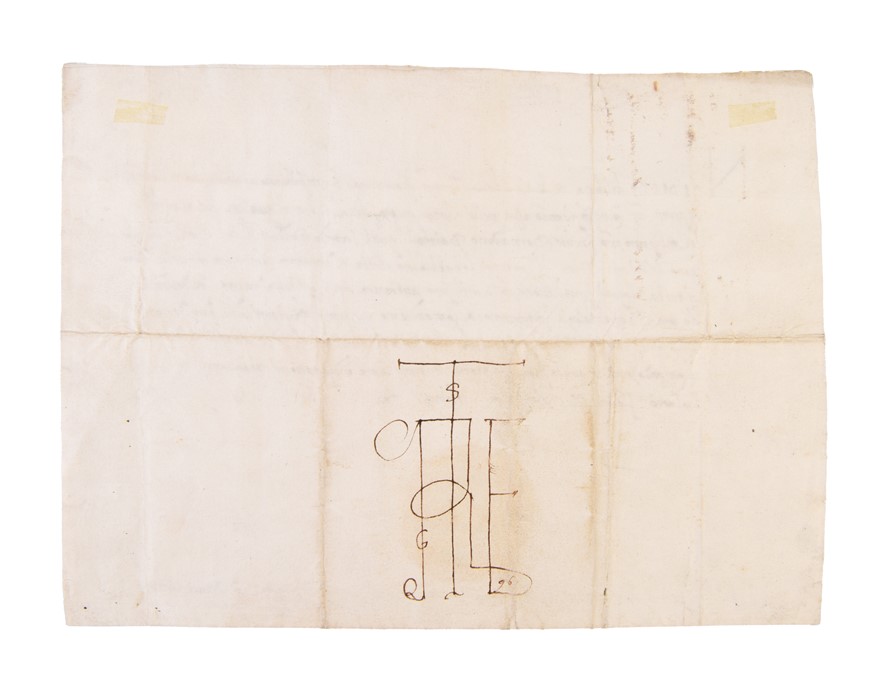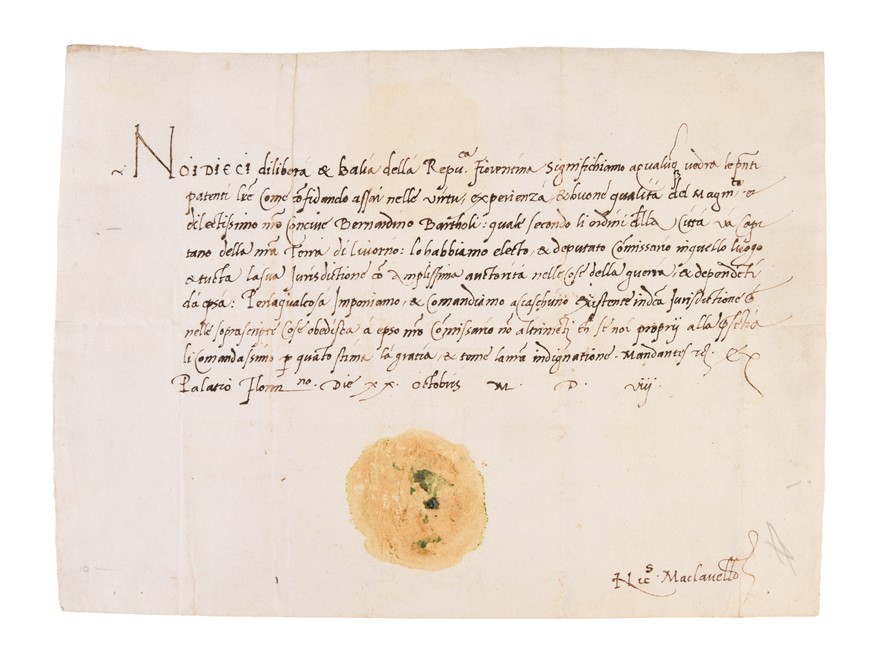Manuscript document appointing Bernardino da Bartoli captain of the territory of Livorno, in the name of the Ten of Florence, with signature Nics. Maclavello. Florence: 20 October, 1508.
MACHIAVELLI Niccolò; DIECI DI BALÌA (1508)
£12500.00
Please contact us in advance if you would like to view this book at our Curzon Street shop.
Single sheet, MS on paper (290 x 214mm). Nine lines of text in neat secretarial hand, some remnants of green wax seal though mostly lacking, signature of Nics. Maclavello at foot, verso blank save for the monogram of the office of the Dieci di Balìa, one horizontal and four vertical fold lines (remnant of tape tabs at head of verso, minor ink burn).
An early document written on behalf of the Dieci di Liberta e Balìa, the Florentine war council, dated 20th October, 1508, and bearing the name ‘Nics. Maclavello’, possibly that of Niccolò Machiavelli.
Written in a neat secretarial hand, it is likely an official copy of a letter of appointment sent on behalf of the council of war to Bernardino da Bartoli, appointing him - for his virtue, experience and good qualities - captain of the Tuscan territory of Livorno in 1508. The Dieci di Balìa - their elaborate sigil inked on the verso of this document - came into being in 1384 and would last for over a century. The council’s responsibilities related principally to external and foreign affairs: maintaining relations and alliances with neighbouring and foreign powers; declaring and conducting war; and deploying troops, ambassadors and spies where needed.
The name at the foot of the document presents something of a mystery. It is credibly connected to Machiavelli himself; the date of the letter places it comfortably within the period that he served as second chancellor to the Florentine Chancery, secretary to the Dieci di Balìa and emissary for the powerful city state; conducting appointments and executing policy decisions on behalf of the Council as here would therefore have fallen well within his remit, in particular any actions relating to the raising or organisation of militias and local forces in the ongoing conflict with Pisa, which had declared its independence from Florence in 1494. In particular it was during this period, in the opening decade of the sixteenth century, that Machiavelli was engaged in overhauling the structure of the Tuscan militia: 'Up until 1512, the Secretary dedicated his efforts to creating and perfecting a recruiting system for a semi-permanent militia, able to meet the defence requirements of the State. This system indeed demonstrated not inconsiderable results at the time of the reconquest of Pisa in 1509' (p.5); perhaps the appointment of Bartoli here formed part of that recruitment drive.
Nor is the variant form that Machiavelli’s name takes at the foot of this document unusual. Taking into account the fluidity of naming and spelling conventions in this period, ‘Machiavelli’ appears in many different forms in correspondence to and from, and documents known to be by him dating from his time in chancelry administration. Similar documents on behalf of the Dieci are countersigned ‘NM’, and ‘N. Malcla’. ‘Malclavello’ and ‘Malclavellus’ in particular, close to the variant Malclavello here, are both associated with him, and indeed, his colleague Biagio Buonaccorsi wrote to ‘Nicolao Maclavello’ in 1506 (see G. Hurlimann, ‘Une lettre “privée” de Machiavel à Piero Soderini’, La Bibliofilia 74.2, 1972, pp.184).
While there is a probable association between Machiavelli and this document, it being in his hand is less likely. The script here does not match closely with known examples of Machiavelli’s writing and appears rather to be a fairly ‘standard’, slightly stiffer notarial hand; he also only appears to have received letters addressed to him as ‘Maclavello’ or ‘Malclavello’, rather than signing and sending them himself under this name. This period in particular was also a time in which Machiavelli was more frequently away from Florence than there – especially in the few months surrounding the date of this document, in late October, when he was travelling around the small towns of Tuscany between Florence and Pisa, tasked with raising local militias.
This document was in the collection of inveterate bibliophile and self-confessed ‘vellomaniac’ Thomas Phillipps (1792-1872). Italian historian Pasquale Villari describes seeing this particular document amongst three folio volumes of unpublished Machiavelli letters in his Niccolò Machiavelli e i suoi tempi (1877-82; later English edition of 1898 referenced here), when he visited Phillipps’ daughter in Cheltenham, who inherited his collection after her father’s death. He writes rather acidly: ‘to Cheltenham I went and held at last the three mysterious volumes. The reader will readily appreciate my surprise, my disappointment, on discovering that in the whole three volumes there was only a single letter which could even be supposed to have been written by Machiavelli!’ He witheringly continues: ‘The first letter, which has no importance, bears the date of the 20th October 1508, is written in the name of the Ten, and at the bottom of the page has the name Nic(o) Maclavello, appended to it according to the usual custom of the coadjutor who copied the registers of the Chancery. This is the sole letter of which the minute may possibly have been his, but we cannot be quite sure even of this’ ('Preface to the first edition', xvii). Villari goes on indignantly that the other letters could not be by Machiavelli, as they were all of a later date, 1513 onwards, when he had been forced out of office and into exile.
The three volumes of Machiavelli letters in Phillipps’ collection were purchased by him from the sale of the library of Richard Heber (1773-1833) (lot 1005 in Evans’ Bibliotheca Heberiana: Catalogue of the library of the late Richard Heber Esq. Part the Eleventh: Manuscripts, 10th February 1836) who had in turn purchased them from the sale of the collection of Frederick North, 5th Earl of Guildford (indeed, the provenance of the albums stretches back to a contemporary and colleague of Machiavelli himself, Francesco Vettori (1474-1539)). It is unclear whether the present letter was always part of these volumes, or was a separate acquisition made by Phillipps and inserted into the volumes later (Bibliotheca Phillippica, MS.8238, ‘Macchiavelli lettere inedite a Francesco Vettori, 3 vols f. ch. 1513-22. “noi dieci”). The fact that the contents of the three volumes are consistently described in both Guildford and Heber’s catalogues as dating from 1513-22, and relating to the Vettori family in particular, would suggest that this document was a later addition. Villari describes it as having been 'placed' at the front of the first volume – whether simply loose or bound in, he does not say – when he visited and suggests indignantly that it was there intentionally, to deceive the viewer into believing the authenticity of the others. Certainly by the time of the Sotheby’s sale of Phillipps-Heber manuscripts in 1968, it had been separated from the albums to be sold on its own (‘Sale of the Celebrated Collection of Manuscripts formed by Sir Thomas Phillipps, Bt. From the collection of Richard Heber’, 25 June 1968).
Stock Code: 252479





